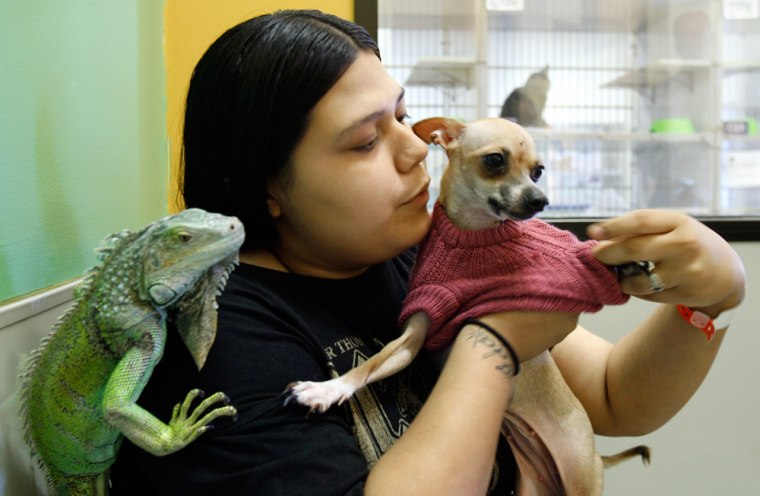Hurricane Ike was about as mighty and destructive as they come, but it couldn't break the bond between Nora Smallwood and her two dogs. She'd just as soon drown than abandon them to Mother Nature's fury.
"They're my life," the 78-year-old said after being evacuated from her home in La Marque, near Galveston. "There was just no way I was going to leave them."
Luckily, she didn't have to. She usually visits Honey and T.T. twice a day, riding a city bus to the Austin Humane Society from her shelter at the convention center.
Like Smallwood, hundreds along the Gulf Coast evacuated with their pets before hurricanes Gustav and Ike roared ashore this month — unlike in Katrina in 2005. Many Louisiana residents were not allowed to take pets on buses, causing more anguish. Others refused to leave their animals behind, leaving many to perish with their pets.
That led to the Pets Evacuation and Transportation Standards Act, passed by Congress in 2006 to make sure state and local governments help pets' during a major disaster or emergency. Texas passed a similar law last year.
"This act is not only saving pets' lives — it's saving human lives," said Scott Haisley, senior director of emergency services for the Humane Society of the United States, which supported the federal law.
In the first major Gulf hurricanes since Katrina, officials in cities across Texas say housing the furry, feathered and scaly loved ones of evacuees has for the most part gone well.
Health regulations prohibit the creatures from living in the same rooms as people, so some cities provide transportation so evacuees can visit their pets at animal shelters. That gives them something to do and makes them feel better during a time of upheaval, officials said.
"That is emotionally comforting to people because they have contact with the only thing they feel they have left," said Dorinda Pulliam, shelter director for Town Lake Animal Shelter in Austin.
'They're like our kids'
In Austin, officials drop off pet supply kits — including carrying crates and waste disposal bags — before evacuees even arrive at the shelters. Other cities have adopted similar models.
Fort Worth keeps evacuees' pets at the city animal shelter and provides free microchips for the critters to make sure they will be matched with their owners.
Evacuees staying at the Dallas Convention Center can play and cuddle with their pets at another area of the complex just across the street.
"We get a lot of hugs from folks with tears in their eyes," said Kent Robertson, a division manager with Dallas animal services. "Their homes have been destroyed, and they don't know what they're going to do, but they have a place for their animals."
But some evacuees resist giving up their animals, even temporarily.
Pulliam said one elderly couple staying at an Austin shelter slept in a car outside with their two cocker spaniels, rather than turn them over to shelter workers.
Last weekend, Galveston resident Ida Navejar ran away from the Austin Convention Center with her iguana, Iggy, and one of her five Chihuahuas, Cha Cha, because she apparently thought she would not get them back from the animal shelter. But the 19-year-old and her pets were found after police put out a bulletin, and Navejar returned after reassurance that her animals would be cared for and later returned.
"They're like our kids," said Ida's mother, Maria Navejar.
Fewer left behind
Before Gustav and Ike, owners weren't the only ones leaving hurricane-prone areas with pets. Animal shelters in harm's way evacuated cats and dogs to several nonprofit animal welfare agencies across Texas.
The SPCA of Texas took in about 300 animals from Louisiana shelters before Gustav hit earlier this month, then accepted 235 more from South Texas shelters in Ike's path last weekend. That's in addition to the 500 cats and dogs already at the SPCA's two shelters in Dallas and McKinney.
"Animals are totally dependent on people, and we have to be there as an organization to do this," said James Bias, president of the Dallas-based SPCA of Texas.
Animal rescue groups in other states helped out by taking some of those cats and dogs, but several hundred remain at the Dallas-area shelters — as well as in other cities. They are up for adoption and won't return to their former shelters, which have to make room for any stranded pets found in the hard-hit cities along the Gulf Coast.
So far, Humane Society workers have rescued several hundred animals after Gustav and Ike. But they said they expect the number to be far less than the 10,000 pets rescued in Louisiana and Mississippi after Katrina — and far less than the scores found dead.
"We are seeing fewer animals left behind," Haisley said.
